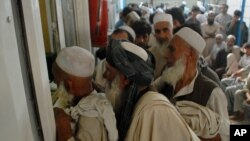Pakistan has extended for one month the stay of about 1.4 million Afghan refugees who lost their legal residency status on Dec. 31, 2017.
Under a trilateral agreement with Afghanistan and the U.N. High Commissioner for Refugees (UNHCR), the host government was considering a proposed one-year extension in the validity of the Proof of Registration (PoR) cards for the refugees.
Prime Minister Shahid Khaqan Abbasi on Wednesday chaired a meeting in Islamabad of the federal Cabinet, which debated the proposal.
"After detailed discussion, the [federal] Cabinet agreed to grant only 30 days' extension for PoR and also decided that the issue of early repatriation of Afghan refugees shall be raised with UNHCR and with the international community," said a statement issued after the meeting.
The Cabinet emphasized that Pakistan's economy has long carried the burden of hosting Afghan refugees and under the current circumstances cannot sustain it further.
Pakistan hosts about 2.7 million registered and undocumented Afghan refugees who have fled decades of conflict in Afghanistan.
Pakistani authorities lately have alleged that militants conducting terrorist attacks on both sides of the border are using refugee localities as hideouts. Islamabad has also pressed the U.S.-led Western partners of the Afghan government to arrange for an early repatriation of the refugees.
Analysts speculated Wednesday's move might have stemmed from Islamabad's diplomatic tensions with Washington, fueled by a New Year's Day tweet from U.S. President Donald Trump.
Trump tweeted that Pakistan has received more than $33 billion in U.S. aid in the last 15 years but continues to harbor terrorists fighting American forces in Afghanistan.
Islamabad denied the charges and called them an attempt to scapegoat it for what it called the "failure" of the U.S. military mission in Afghanistan.




